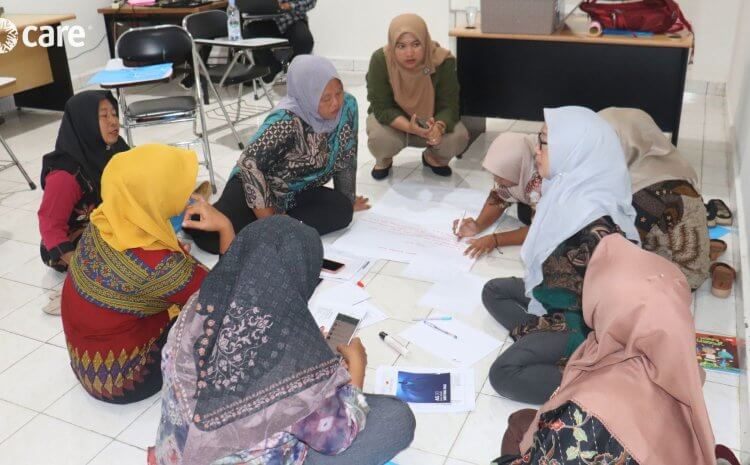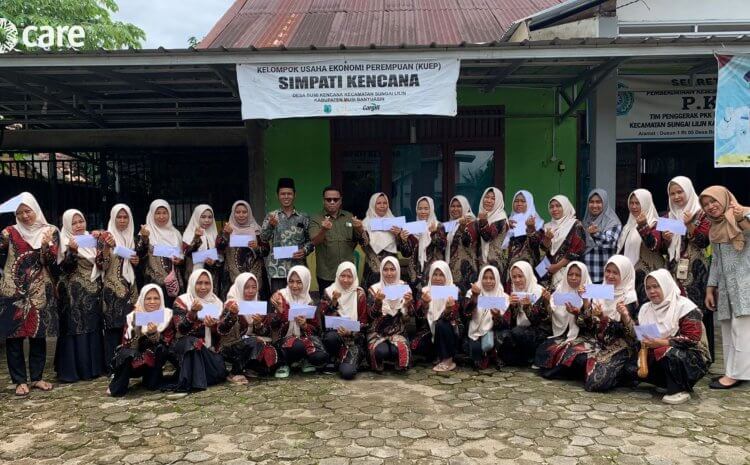The role of women in the Indonesian economy is increasingly prominent. This is evident from the growth of the Labor Force Participation Rate recorded by the Central Statistics Agency (BPS), rising from 58.84% in 2022 to 60.18% in 2023. Additionally, the Coordinating Ministry for Human Development and Culture noted an increase in the proportion of Micro, Small, and Medium Enterprises managed by women, rising from 60% in 2021 to 64% in 2022. Strengthening women’s roles in the economy is facilitated through the implementation of financial literacy training and the management of Women’s Economic Group Enterprises (Kelompok Usaha Ekonomi Perempuan / KUEP) in the villages of Suka Damai and Sungai Lilin, Musi Banyuasin District, South Sumatra (27-28/2). Since its establishment in early 2024, financial literacy training has been the first training conducted for the groups.
Sixteen female representatives from two business groups participated in the training. They directly practice the creation of financial records, savings books, loans, deposits, and generating financial reports for the business groups. Riatama, the Secretary of Damai Maju Women’s Economic Group in Suka Damai Village, emphasized that understanding financial management is crucial for the optimal operation of their business group. “I now have a better understanding of the potential of the Women’s Economic Group to enhance women’s economic independence in Suka Damai Village. We can support each other in accessing better financial resources and expanding business opportunities. This training provides essential knowledge for us, the management of the group, to further develop and grow our small businesses,” she said.
Not only participated on basic financial management, Riatama shared that all participants were engaged in discussions about effective and transparent governance strategies and inclusive membership management. “We learned about fundamental elements that crucial for the group management in building and developing the group,” she expressed.
Various forms of calculations in managing the group’s business to ensure transparency and financial accountability of the KUEP were also discussed during the session. This included calculating loan services, savings services, and profit distribution. On the second day of the training, participants were also encouraged to solve various case studies related to financial management.
Herawati, Board of the Cahaya Sejahtera Women’s Economic Group in Sungai Lilin Sub-district, shared that the training process has instilled confidence in all participants regarding their capacity to manage the group. “This training has been very beneficial for our Women’s Group. I now have a better understanding and confidence in managing the finances of our group – including savings and loan funds, as well as the craft business that we will be operating. I feel more prepared to fulfill my role as a member of the management team,” she stated.
The Damai Maju and Cahaya Sejahtera Women’s Economic Groups have joined the list of the KUEP supported by CARE Indonesia (YCP) in Musi Banyuasin District since 2022, bringing the total to 13 business groups. Through the Women’s Empowerment Program in Oil Palm Communities, YCP promotes gender equality and strengthens women’s roles in 13 villages in South Sumatra.
Rasyid Rasiki, Project Manager and Livelihood Technical Lead at YCP, explained that KUEP serve as a platform for women to gain better access to financial services and develop locally-based productive ventures. This enables rural women to become more economically self-sufficient and play an active role in local economic development. “By providing access to savings and loan facilities, KUEP serves as a gateway to enhancing the resilience of women in oil palm plantation communities. Financial literacy and management are essential to establishing a strong foundation for building women’s groups,” he said.
Rasyid further shared that in the initial stages of establishing KUEP, YCP provides guidance to ensure that members understand the creation of simple bookkeeping and group management. This guidance continues while developing types of group businesses. “One of the activities that KUEP will undertake is a simple savings and loan scheme, where members can save and borrow money at low interest rates,” he said.
After completing the training, participants will proceed to disseminate the training results to other KUEP members. “It is hoped that other KUEP members can also understand these important concepts and collectively improve the overall management quality of KUEP, thereby enhancing the economic well-being of families and rural communities,” Rasyid concluded.
Writer: Nurainy Darono, Editor: Swiny Adestika




